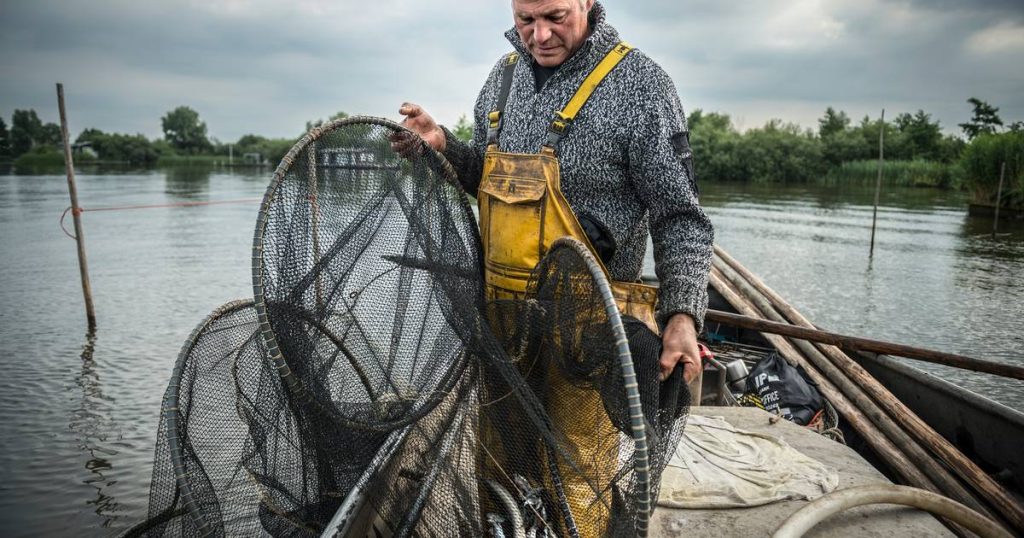“Worrying,” says SGP MEP Bert-Jan Ruissen. But: “a blanket ban is a very strict measure.” Dutch eel fishermen think so, too. They are determined to keep hunting. They say it’s not bad at all.
The frightening images of unemployed eel fishermen, ships on a chain and a blank consumer plate is not a problem, according to Chairman Albert Jan Matt of Visnetwerk and Secretary Dirk Jan Bernds of Nederlandse Vissersbond, who together run the entire Dutch eel fishery—representing n hundred companies.
This sounds different at the International Council for the Exploration of the Sea (ICES). This council of scholars has been advising a very cautious hunting policy for years and now for the first time a complete ban. “The European eel stock remains critical,” the council said. “We recommend against fishing in all areas before 2022.”
They say the Netherlands sees that a large number of the measures it has taken have already been rewarded. Eel hunters go out for a limited number of months each year (except in Friesland, where quotas apply). In addition, eel stocks are strictly monitored, trays of adult eels are taken out to sea in Harlingen every year, and glass eels are released into inland waterways.
Difficult passages, for example, flood defenses and pumping stations, have also been made more fish friendly so that glass eels can enter more easily and adult eels can exit more easily. “The Netherlands has been committed to protecting and improving eel stocks since 2009, and has previously urged tougher measures in a European context,” the LNV Ministry said in a short written response.
According to Maat, the results in the Netherlands are good, but a country like Spain, for example, can still do a lot. “Many inland waterways have been closed due to various works. This means that, as with us, you have to provide eel passages.”
“Why ban fishing, did not go well with eel”
Eel hunters react by surprise when the International Council for Marine Research (ICES) calls for a complete ban on fishing. “This advice is meaningless,” says Ale de Jager of the fishing company of the same name from Reduzum.
He only sees an improvement in the eel stock and does not understand what the advice is based on. Things didn’t go so well with the eel in IJsselmeer as they do now. In recent years many glass eels have been released and we catch a lot of small eels. This proves that current measures to boost eel stocks are working successfully.”
quota
In the months of September, October and November, professional fishermen in the Netherlands are prohibited from catching eel species in inland, coastal and offshore waters. Then it is prohibited to fish with fishing equipment intended for catching eels. An eel that ends up as a by-catch must be released in the allowed nets during this period. Sports fishermen should always return the caught eel, states the Dutch Food and Consumer Products Safety Authority website.
De Jäger: In Friesland we have a quota instead of a ban on hunting. It comes to 36 tons of eel per year for twelve fishermen. This pilot project is also paying off. The eel is only getting better. Although the numbers are lower than they were in the 1960s and 1970s, that time will never come back.”
“There is no progress in the Netherlands as a whole”
Tessa van der Hamen, an eel researcher at Wageningen Marine Research, isn’t surprised in the least by the zero-fishing advice. “This was advised by the International Council for Strategic Studies several years ago, but has now written it more clearly and clearly.”
According to her, the advice is based on the precautionary principle. “Eel stocks have decreased dramatically since the 1980s. In recent years there has been no progress in the Netherlands as a whole. There is only little progress at the IJsselmeer,” says the scientist who is also a member of the ICES Working Group on Eel (WGEEL).
According to her, it is up to politicians to assess what to do with the advice. “The eel regulation is based on a different approach. There is no zero problem with this regulation.”
At the end of last year, biologist Willem Decker, an international authority on eel research, championed a serious debate about the negative consequences of clogging in the water on eels. “I understand that not only can you remove a lock or a hydroelectric plant, but now that eel stocks have been at a stable low level for ten years, countries should use all solutions,” he told Trouw.
Van der Hammen: The decline in eel numbers may be due to a combination of factors. Because we don’t know exactly, we don’t know if the eel stock will improve in the coming years.”

“Total coffee specialist. Hardcore reader. Incurable music scholar. Web guru. Freelance troublemaker. Problem solver. Travel trailblazer.”








More Stories
GALA lacks a chapter on e-health
Weird beer can taste really good.
Planets contain much more water than previously thought